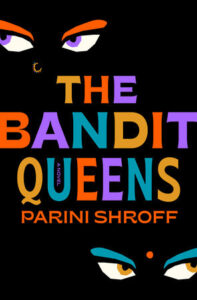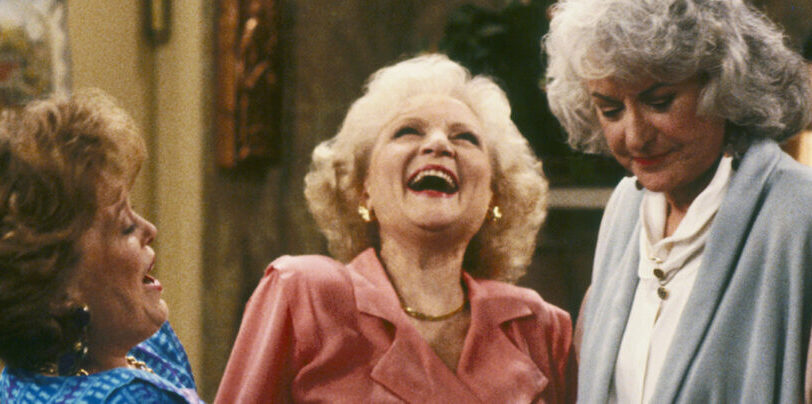Thank You for Being a Friend: Lessons in Writing and Life from The Golden Girls
Parini Shroff on Writing Against Tropes and Celebrating Platonic Love Stories
In 1990, when my mother and I moved back to the States, I was about five years old and knew no English. Television sitcoms played a huge part in both of us learning the language; we watched everything with Closed Captioning—a habit I maintain to this day. I remember watching reruns of The Golden Girls on Lifetime and later the Hallmark Channel; I got to know them so well, I could quote not only the episodes, but also the portions the networks deleted to accommodate more commercials.
Back then, those four women felt like my own friends, and even now, I regularly watch for their company. In contrast to many of its contemporaries, The Golden Girls has, like its characters, aged with grace, triggering very little of the cringe I often feel upon viewing other older sitcoms.
In 2020, while quarantining with my then-boyfriend and writing my novel The Bandit Queens, I re-watched the series for the umpteenth time, but this viewing was special. I didn’t realize appreciating The Golden Girls was a litmus test until he too adored these ladies. Had he not, I’m not entirely sure I would have agreed to marry him.
The Golden Girls showcases four older female roommates (three widows and one divorcée) navigating life after marriage and children. As Rose says in the pilot episode, “It’s not fair, you know. I mean, we get married, we have kids, the kids leave, and our husbands die. Is that some kind of a test? You don’t work that hard, you don’t go through everything you go through to be left alone. We are alone, Dorothy, we really are.”
I didn’t realize until after the fact how much TGG inspired me while I was writing The Bandit Queens—particularly how beautifully the show balanced such difficult and even controversial issues with humor and generosity.
TGG touched upon “discarded women”: Dorothy’s philandering husband abandoned her, Rose and Blanche were widowed, and Sophia was dumped in a nursing home by her daughter (Dorothy) before moving in with the girls. It’s mentioned that none of them thought they’d be living with roommates or worrying about money at their age. However, in finding each other, they forge a second family. As Dorothy summarizes, “We made a pact a few years ago that if anything happened to any one of us, the other three would take care of her. Sort of an extra insurance policy.”
The Bandit Queens, follows Geeta, a working woman whose husband abandoned her, but everyone in her village thinks she killed him. Such a rumor propels other aspiring “self-made widows” to seek her consultation in disposing of their own abusive husbands. Geeta and these other women are then thrust into an escalating situation where they must make choices to protect each other. They are, essentially, each other’s insurance policies.
TGG turned what could’ve been a lonely and isolating period of life into one of renewed hope and hilarity. Throughout the series, we see these women find purpose: three of them work and all of them spend ample time volunteering for the community. Yes, they date (a lot), but they passed the Bechdel Test well before it existed. There’s dancing, singing, cheesecake and—what truly shattered stereotypes surrounding older women—unapologetic enthusiasm about and analyses of sex.
The audacity, right? Women, past a certain age, living a third act outside of motherhood and wifehood, being sexual, being bold, being funny. (It bears highlighting that these four women are the only all-female cast to have each won Lead Actress Emmy awards.)
In writing the comedic interplay between women in The Bandit Queens, I realized the show not only helped me learn Engish; it helped me learn how to be funny as well. It is no secret that the ladies of TGG can be savage to one another. Even naïve, good-natured Rose gets her kicks in: “Dorothy is the smart one, Blanche is the sexy one, Sophia is the old one, and I’m the nice one!”
To me, what makes their perceived catty comments and petty fighting part of their friendship rather than a detriment to it is the core canonical principle that all four of them will ultimately choose each other over an outsider (usually a man) every single time. Despite the name-calling and the snark, they are fiercely loyal and protective. To paraphrase Dorothy, they do not just share a house, they share their lives.
This show sparked within me an interest in further exploring female friendships and dynamics. While writing The Bandit Queens, I wanted to utilize TGG’s mixture of snark and love in my novel. Yes, I realized that I was addressing heavy topics such as domestic violence, casteism, and patriarchy. But to pigeon-hole these women as only downtrodden, only oppressed would have been a giant disservice. Not to mention a series of missed opportunities.
They’re whole women, with identities that reach well beyond the labels of wife, mother, daughter-in-law. Though the novel’s main protagonist is Geeta, I view The Bandit Queens as an ensemble cast because it is in finding each other that the humor is not only possible, but inevitable. As a result, much of the comedy in The Bandit Queens comes from the women throwing barbs at each other even as they’re working together to extricate themselves from difficult and dangerous scenarios.
In examining many of my friendships, I’ve realized that we are at times “rough” with each other in our jokes simply because we can be. It’s safe to do so when you know your friend has your back anytime you find yourself struggling. My best friend and I are protective of, and admittedly a little territorial with, each other. In a recent social media post dedicated to her wonderful husband (who is also my dear friend), she called him her “best friend.” I immediately raised a brow. (She quickly clarified. We’re good.)
These feelings are likely why, to me, the love story in The Bandit Queens is how Geeta and her best friend-turned-nemesis, Saloni, rekindle their friendship. In their youth, a man drove a wedge between them and it is eighteen years later, with murder flying in the air, that they come together again. Set against the backdrop of TGG, this made sense to me. I think it is common in our youths to be so enchanted with the idea of finding another, finding happiness in another, that we forsake our friendships (even unintentionally) for the notion of The One. It is with regret that I admit to such foolish behavior myself in my early twenties.
I wrote Saloni and Geeta’s falling out as an example of those beautiful friendships that are undone by rivalry, circumstance and insecurity. I wrote their reunion as a clarion call for second chances. To choose to be a friend, even when it is not necessarily easy to trust someone. In one episode of The Golden Girls, Blanche is jealous of how well Dorothy is performing in their shared work environment.
When she acts out, Dorothy says, “Now listen, up until the time we started working together, you were my best friend. The reason we were such good friends was because you trusted me. Now all of a sudden, I don’t know, you think I’m some other person, someone who’d stab you in the back. I am not that person. Blanche, I am still your best friend, whether or not you think so.”
We are not doomed to be only discarded women or rivals. Our multitudes are not contained by curated and perpetuated tropes: catty, vain, jealous, manipulative, backstabbing. We are capable of the kind of bonds that save your life every day. Often the world makes it difficult to fully enjoy the experience of being a woman (or anyone’s true self, really). For the characters in The Golden Girls and The Bandit Queens, friendships are what carry them through, long after husbands die, long after husbands philander, long after husbands.
In their later years, the Golden Girls embrace the value of their love stories with each other. I hope that theme resonates with those who read The Bandit Queens. And if while reading, you see glimmers of your own beautiful, spectacular friends, call them up. Maybe even sing: Thank you for being a friend.
__________________________________

The Bandit Queens by Parini Shroff is available now via Ballantine Books.




















